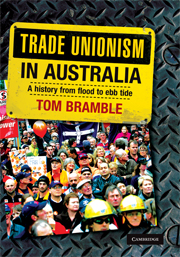Book contents
- Frontmatter
- Contents
- List of figures and tables
- List of acronyms
- Preface
- Introduction
- 1 Trade unionism in the postwar boom, 1945–67
- Part 1 The flood tide, 1968–74
- Part 2 The stand-off, 1974–83
- Part 3 The ebb tide, 1983–2007
- 5 The ALP–ACTU Accord, 1983–90
- 6 Enterprise bargaining and a revived employer offensive, 1990–96
- 7 Unionism in a cold climate, 1996–2004
- 8 WorkChoices and the defeat of the Howard Government
- 9 Results and prospects
- Notes
- Index
8 - WorkChoices and the defeat of the Howard Government
Published online by Cambridge University Press: 05 May 2010
- Frontmatter
- Contents
- List of figures and tables
- List of acronyms
- Preface
- Introduction
- 1 Trade unionism in the postwar boom, 1945–67
- Part 1 The flood tide, 1968–74
- Part 2 The stand-off, 1974–83
- Part 3 The ebb tide, 1983–2007
- 5 The ALP–ACTU Accord, 1983–90
- 6 Enterprise bargaining and a revived employer offensive, 1990–96
- 7 Unionism in a cold climate, 1996–2004
- 8 WorkChoices and the defeat of the Howard Government
- 9 Results and prospects
- Notes
- Index
Summary
WorkChoices
The context for WorkChoices
Although the Workplace Relations Act 1996 represented the most drastic anti-union legislation for several decades, the Federal Government was constrained for its first nine years in office because it lacked a majority in the Senate. With the achievement of a majority in both houses following the 2004 federal election, Howard proposed a total overhaul of the federal arbitration system, which took shape in the Workplace Relations Amendment (WorkChoices) Act 2005.
One interpretation of WorkChoices, initially promoted strongly by the ACTU and ALP, was that it resulted from a single-minded right-wing ‘ideological’ obsession on the part of John Howard, supported by conservative lawyers and business lobby groups. In a speech to the National Press Club in June 2005, ACTU secretary Greg Combet explained:
… John Howard is offering the realisation of a long-held IR prejudice. His is a backward-looking agenda to cut labour costs, to find our economic way in the world by preying on the weak and vulnerable, by attacking fairness and democratic principles.
Combet argued that WorkChoices was a ‘radical’, ‘reckless’, ‘irresponsible’ and ‘biased’ plan. ‘Irresponsible’ because it was not in the interests of business to pursue a strategy based on cutting wages. Such a strategy would not address ‘the real economic priorities facing Australia’. Australian business would benefit far more by fixing problems in infrastructure investment, skills, and research and development, which were resulting in ‘slow growth in high-value exports, under-performance in the generation of highly skilled jobs, and sluggish productivity in the tradeable goods sector’.
- Type
- Chapter
- Information
- Trade Unionism in AustraliaA History from Flood to Ebb Tide, pp. 210 - 238Publisher: Cambridge University PressPrint publication year: 2008



